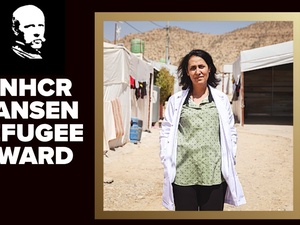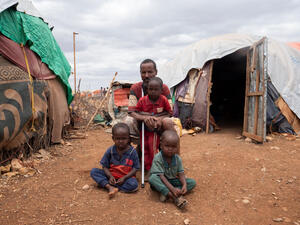Legal aid project on the right to documentation for internally displaced persons in Mozambique
Legal aid project on the right to documentation for internally displaced persons in Mozambique

A displaced woman (left) is attended to at one of the legal clinic desks in Josina Machel neighbourhood in Pemba, northern Mozambique.
CABO DELGADO, Mozambique - UNHCR, the UN Refugee Agency, has partnered with the Catholic University of Mozambique to pilot a legal aid project for internally displaced persons in Mozambique.
The project, currently underway in Josina Machel, a neighbourhood in Pemba, offers legal counselling and assistance to internally displaced persons (IDPs) and their hosting communities on issues related to birth registration and legal documentation.
“It’s crucial that we do this work because the situation in Cabo Delgado is very serious and dramatic,” said Bianca Gerente, the project coordinator and Dean of the university. “We are serving the community and helping those who have lost everything, including their identity and dignity. Many of the displaced do not know about their rights so it is very important to provide them with this information.”
The humanitarian situation in Cabo Delgado province has continued to deteriorate, leaving over 530,000 IDPs scattered across the province and the neighbouring Nampula, Niassa and Zambezia provinces. The situation is worsened by chronic underdevelopment, consecutive climatic shocks and recurrent disease outbreaks in the region.
Entire families continue to flee violence in the northern part of the country, with little or no belongings, surviving with almost nothing for days. The forced displacement of many families has resulted in the loss or destruction of personal and civil documentation and registries, creating issues for many who have no means of proving their identity – this can have serious consequences for individuals and communities, including restricted freedom of movement, limited access to life-saving assistance and exposure to harassment or arbitrary arrest and detention.
The pilot project aimed to support 10,000 IDPs and their hosts over a two-month period. So far, more than 7,000 people have approached the legal clinic stands, where mobile teams of two pro bono lawyers and law students work every weekday, from 8:00am to 3:00pm.
Hundreds of people queue every morning, waiting for the legal services. The majority are women and children who fled armed attacks from Quissanga and Macomia districts in northern Cabo Delgado.
The main concerns are lack of birth certificates and national ID cards, as well as registration of deaths and marriages and other changes in civil status.
“We abandoned our house in just one day, with few items as we had to walk for many kilometres. Now we are here in a new village, in a new district, not knowing what to do,” explained Martiza, a displaced mother of two, as she queued to speak to one of the lawyers.
She hopes that the legal support that she receives will help her move forward with her life.
“This legal support will help us have an identity once again, receive humanitarian aid and claim our land. We will feel like somebody again,” she added.
Lacking documents in a context such as this can make situations worse for displaced people. When forced to flee within the country or cross an international border, a person lacking identity documents cannot travel safely. Children separated from their parents and without identification are more vulnerable to trafficking. Accessing goods and services that facilitate self-sufficiency and local integration, such as education and health care can be very difficult. Displaced people can also face discrimination and random interrogations and harassment from law enforcement agencies.
“This is a lesson in humanity. Protecting displaced people is vital and a collective effort - together we can combat adversity and establish a safe environment for them,” said Angele Dikongue-Atangana, UNHCR’s Deputy Director for the Southern Africa Bureau.
For more information on this topic, please contact:
- In Maputo, Francesca Fontanini, [email protected], +258 84 312 0930
- In Maputo, Juliana Ghazi, [email protected], +258 84 321 1545








